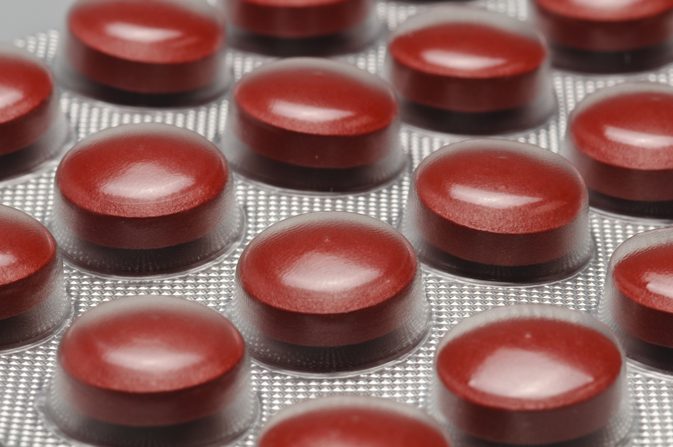
Many people take an iron supplement to help improve energy levels and prescribed to others with iron deficiencies.
Iron is an essential nutrient that supplies the building blocks for red blood cells, which transport oxygen from your lungs to the rest of your body.
If your iron levels are low–as they are for a huge swath of the population–you can suffer fatigue, reduced aerobic fitness, and a host of other negative side effects.
This is where iron supplements come in. An iron supplement can deliver a concentrated dosage of iron, ideally in a highly absorbable form, to rectify your low iron levels.
However, not all iron is created equal. Some forms of iron are better absorbed than others, and some forms are less likely to result in negative side effects.
Our researchers looked into the iron supplements on the market and identified the best.
1. Solgar Gentle Iron
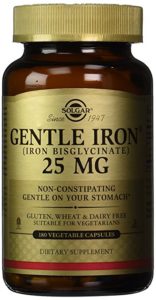
Click here for the lowest price on Amazon
Solgar’s iron supplement distinguishes itself by avoiding the common ferrous sulfate form you’ll find in many other iron supplements.
Ferrous sulfate is an inexpensive and effective form of iron, but many people find that it causes constipation, stomach cramping, or other gastrointestinal side effects. Solgar’s bisglycinate iron should help avoid this.
2. Proferrin ES
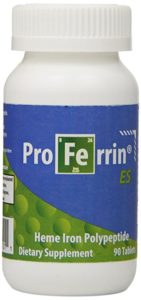
Click here for the lowest price on Amazon
If you have chronically low iron that has not responded to other supplements, Proferrin ES is the way to go.
It provides its iron in “heme” form, meaning its ability to be absorbed should be vastly greater than a mineral form iron supplement like ferrous sulfate.
The only downside of Proferrin ES is that there is less research on its actual efficacy; while all the biochemistry literature supports the claim of increased bioavailability of heme form iron, the actual clinical work is still being done.
3. Ferretts Iron Supplement
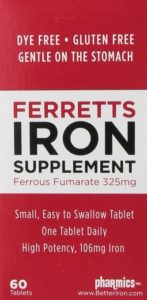
Click here for the lowest price on Amazon
Ferretts Iron Supplement is a good choice if mainstream ferrous sulfate supplements are causing too many side effects for you.
While this is still a mineral salt form of iron, Ferretts provides ferrous fumarate instead of ferrous sulfate. You may find that your stomach handles this better than the ferrous sulfate in other brands.
Another attractive aspect of Ferretts Iron Supplement is its lack of fillers and artificial coloring agents.
4. Thorne Research Iron Bisglycinate
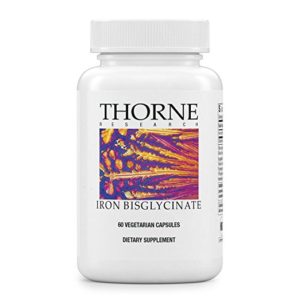
Click here for the lowest price on Amazon
Thorne Research is known for providing straightforward, no-nonsense supplements, and that’s exactly what they deliver with their iron supplement.
It’s in the chelated bisglycinate form, which means it’s great if normal iron supplements give you constipation, cramping, or stomach pain.
The only downside is that the dosage per capsule is lower, so if you are seriously deficient, you’ll need to take a lot of pills.
5. Nature Made Iron
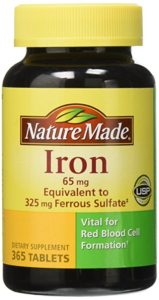
Click here for the lowest price on Amazon
While Nature Made provides an easy and simple ferrous sulfate supplement that’s extremely popular, they make the curious choice of including a small amount of calcium in the formulation.
Calcium is a well-known inhibitor of iron absorption, so while the actual amount is pretty small, it’s still puzzling why they’d bother to include it.
6. Vitron-C
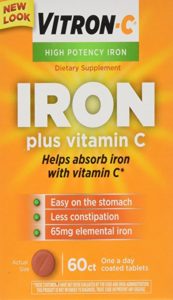
Click here for the lowest price on Amazon
Vitron-C takes advantage of the fact that vitamin C boosts the absorption of iron when consumed in a supplement. Each supplement contains 200% of your recommended daily intake of vitamin C.
Unfortunately, all of the absorption benefits of the vitamin C is likely offset by the fact that the iron is delivered in “reduced” form–it’s literally small flakes of metallic iron that make up the iron content of the supplement.
This means that the supplement is relying on your stomach acid to dissolve the iron and make it biochemically available to your body, which will reduce its overall bioavailability.
7. Feosol
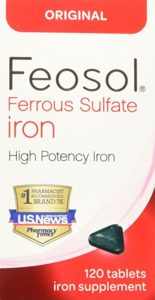
Click here for the lowest price on Amazon
Feosol was one of the original and most popular iron supplements, but it’s starting to show its age. While the iron dosage is high, and the ferrous sulfate form is a simple and straightforward way for many people to get the iron they need, there are a lot of extraneous ingredients.
Do you really need several different artificial coloring agents and polymers in a lowly iron pill? It also contains milk derivatives, which is a real head-scratcher: any trace calcium will reduce iron absorption, and it also disqualifies anyone who can’t consume dairy products from being able to take this supplement.
8. Garden of Life Vitamin Code Raw Iron
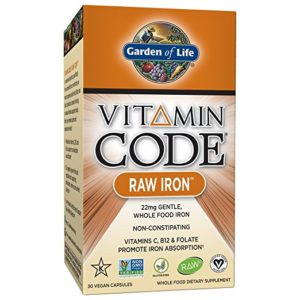
Click here for the lowest price on Amazon
Garden of Life’s trademark strategy is to provide vitamins and minerals in their raw, natural form, ideally from powdered, dried fruit and vegetable concentrates.
Usually, this is a great idea. However, in the case of iron, research into the bioavailability of iron has discovered that the same kinds of compounds that give fruits and vegetables their overall health benefits are also responsible for markedly lowering the absorption of iron, when consumed at the same time.
Getting extracts from fruits and vegetables is great, but it’s not so great when you are trying to maximize your iron absorption.
9. New Chapter Iron Food Complex
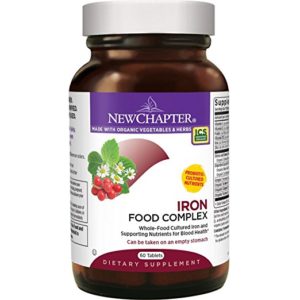
Click here for the lowest price on Amazon
Taking a page out of the Garden of Life playbook, New Chapter mixes its iron supplement in with over a dozen other herbal and vegetable ingredients.
It faces the same problem as Garden of Life’s iron supplement: many of these naturally-derived compounds actively inhibit iron absorption, so the relatively limited iron content of the supplement (only 50% of your daily recommended intake) will be diminished even further.
Finally, while the iron in the supplement is “culture derived,” it’s still just ferrous fumarate, a mineral salt form of iron.
10. NovaFerrum Iron Drops
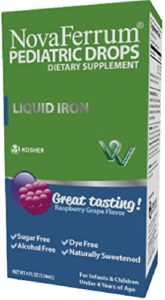
Click here for the lowest price on Amazon
NovaFerrum provides an alternative to capsules and pills if you truly abhor taking them, but there are a number of disadvantages of liquid iron.
First, you can’t accurately determine the dosage, and second, NovaFerrum provides its iron in an unusual polysaccharide form of iron with unknown bioavailability properties.
Unless you have a good reason to use liquid iron, there are better options out there.
Iron benefits and side effects
For something in your body as important as iron, you’d expect an iron deficiency to be pretty crippling, and you’d be right.
Fatigue, weakness, chest pain, and brittle nails are just a few of the symptoms of iron deficiency, according to the Mayo Clinic (1).
Benefits
If you have iron deficiency, you can benefit greatly from taking an iron supplement. The main objective of a supplementation routine is to raise your iron levels back into the normal range, and there are two major factors that determine how rapidly this will happen.
The first of these is the amount of iron that’s absorbed by your body. Note that this is not the same as the dose of iron you take.
Nutritional research has established that different forms of iron–even in the same dose–are absorbed at vastly different rates (2).
Not only that; the other foods you consume around the time of your iron supplement affect the amount that is absorbed.
Some things, like calcium and the tannins in tea, reduce iron absorption, while others, like vitamin C, enhance it. There is some evidence that “heme” form iron is more absorbable than mineral salts of iron like ferrous sulfate (3).
The other factor that impacts your ability to raise your iron levels is how well you can avoid the negative side effects of iron.
We’ll go in depth on these later, but what you need to know is that your body may respond differently to the various forms of iron.
The most common form of iron that you’ll encounter is mineral salt iron. This is iron that’s been chemically bonded to a salt, like ferrous fumarate or ferrous sulfate.
These are inexpensive and effective ways to deliver a high dose of iron, but they do have a tendency to cause gastrointestinal side effects. Even so, for most people, a mineral salt is often the easiest and most effective type of iron supplement.
The next form of iron is chelated iron, which can be further broken down into “heme” iron and other chelated forms of iron.
Heme iron is thought to be absorbed more effectively and has the added benefit of potentially being easier on your stomach (4).
Other chelated forms of iron, like iron bisglycinate, may not be absorbed as well, but do have a reputation of being much less likely to cause side effects.
The final form of iron you may encounter is liquid iron. One recurring idea about iron supplements is that “liquid iron” is absorbed more effectively than a standard iron tablet.
Despite this factoid being repeated many times online, there’s no evidence that liquid iron is actually absorbed any more effectively–they usually contain the same mineral salts of iron that a tablet does, and tablets are rapidly and effectively broken down in your stomach.
Liquid iron might be nice to mix in with a protein shake or a smoothie, but it makes it very difficult to measure out accurate doses, which is pretty important when it comes to iron supplements.
Side effects
Side effects of taking iron supplements can be broken down into short-term and long-term effects.
In the short term, iron supplements are notorious for causing constipation, stomach aches or cramps, and other gastrointestinal issues (5).
It’s not clear why, but some people are more prone to these side effects than others. One person might be able to take a high dosage of mineral iron with no issues, while another may experience constipation even at lower doses.
One way around the problem of gastrointestinal issues is to use a chelated form of iron, either “heme” form iron or bisglycinate iron.
While these may or may not be more bioavailable, and they are usually more expensive, they do tend to work better in people who are sensitive to the side effects of mineral salt iron (e.g. ferrous sulfate).
Over the long term, taking an iron supplement when you don’t need it can increase your risk of serious disease. One study, published in the Journal of the National Cancer Institute, found that increased iron consumption is related to a higher risk of colon cancer (6).
An article in the American Heart Journal suggests that high iron levels may be associated with heart disease, too, and offers this as a partial explanation of why men are at higher risk for heart disease, as they have much higher iron levels and higher rates of iron consumption than women (7).
One final risk is a condition called hemochromatosis. This only occurs in people with a specific genetic mutation, but it’s fairly common–as many as 1 in 200 people carries this mutation, which affects your body’s ability to process iron (8).
For these people, an iron supplement would be very dangerous. Fortunately, a simple ferritin test can both tell you whether you have hemochromatosis, and whether you are iron deficient.
Of course, anemia has its own list of negative health effects, so the best course of action is to get your iron checked on a yearly basis to see whether you need to continue your iron supplementation routine.
Recommended Dosage
Scientific studies vary widely when it comes to the ideal dosage of an iron supplement to raise your iron levels.
Anywhere from 100 to 200 mg of iron per day seems to be a good place to start based on the scientific literature.
You can try a lower dosage for several months to see if your iron levels improve, and if they don’t, up the dosage to 200 mg per day or more.
Recap
Iron supplements aren’t for everybody, but for people who are iron deficient, they can be critically important for fighting off fatigue, poor aerobic fitness, and the other negative effects that are associated with the condition.
Selecting the right iron supplement can keep your iron levels high without negative side effects, and while it might take some patience to find the right dosage and the right supplement, the results will pay off when you get it right.
https://bodynutrition.org/iron/
No comments:
Post a Comment